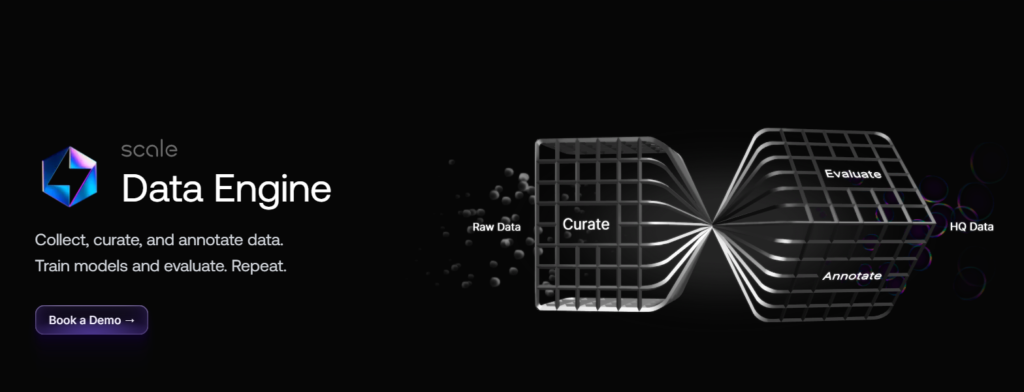You think all the companies like Meta, Amazon, and OpenAI are building their AI from scratch, but it’s not true. There are different layers where each company contributes its own workforce. Companies like Nvidia solve computing power, OpenAI solves algorithmic problems, and Scale AI solves data pillars. Scale AI text annotation tool plays a critical role in the AI ecosystem. After the latest investment round, its valuation goes up to nearly $14 billion.

Scale AI Text Annotation tool’s Evaluation
Founded in 2016 by Alexandr Wang and Lucy Guo, Scale AI was born out of their keen understanding. The growing need for high-quality data in AI development is massive. Early on, they envisioned a platform to simplify data labeling and annotation, initially branding it as Scale API. This service provided on-demand tasks that algorithms alone couldn’t manage. Their work with the self-driving car industry highlighted the demand for top-quality data. Those data led to rebranding and a shift toward the broader AI industry.
Core Products
Scale AI now offers four core products:
Scale Data Engine: This platform helps machine learning teams to gather, refine, and annotate data for training and assessing. Self-driving car startup Nuro utilizes this tool to pinpoint critical situations from its training data.
Scale Donovan: Designed for the US government and defense sector. This product ingests defense data and organizes it to make it interactable, aiding in strategic decision-making.
Scale Generative AI Platform: Enables enterprises to compare, test, and deploy foundational models. Companies like OpenAI, enhancing AI applications across various industries.
Scale Spellbook: Allows developers to build, compare, and deploy their own large language model applications.
Notable Investment and Valuation
Scale AI text annotation tool raised $1 billion in a round led by Accel. It values the data labeling and evaluation startup at a stunning $13.8 billion. The valuation is nearly double the $7.3 billion. The San Francisco-based startup hit after a $325 million raise in April 2021. The new financing included some of the biggest names in tech, with Nvidia, Meta, and Amazon all investing.
Real-World Applications and Impact
In recent times, Scale AI’s product is being used in the Russia-Ukraine war. Scale Donovan helps analyze satellite imagery and other data to make informed decisions. In healthcare, AI can analyze medical data like gene sequences, neurology, and all other modern data reports.
The Importance of High-Quality Data
You can’t send a parcel without a meaningful address. Every company needs data to target its audience and show them what they actually want to see. Without high-quality data, companies can’t train those models to show you targeted ads or products. And Scale AI’s success lies in its ability to provide high-quality data.
Alexandr Wang, co-founder and chief executive, described it as “one of the least sexy problems in AI”. It has given Scale a central position in the booming sector. Scale AI would be one of the key leaders of AI development.
Selecting Dataset Labeling Vendor: What Factors to Consider?
One of the key determining factors for your machine learning model is going to be how well you train it within the datasets you provide it. Selecting a data labeling vendor is a responsible task, and there are several criteria one needs to look for. You will start assessing a company based on these factors and have knowledge about the process, ways of working, and the potential output you may get.
Here is what the Scale AI company review looks like as per our parameters:
- Service and products
- Dataset types
- Data annotation tools
- Integrations
- Annotation process
- Quality assurance
- Pricing models
- Security and data compliance
Scale AI Dataset Types
If you take a look overview from Scale AI,one can see that the company has accumulated a significant base of use cases across industries. It is thanks to the diverse dataset types they operate on:
Text: Scale AI covers document annotation and transcription covering other forms of documents. It applies to natural language processing models and other types of content. You will be able to annotate datasets for content classification, text generation, transcription, content collection and named entity recognition over the different use cases.
Image: It can annotate visual data which include electro-optical imagery, infrared, and transcription images. You can perform this annotation with bounding boxes, polygons, key points, ellipses, cuboids and lines. Supported use cases: object detection and classification, semantic segmentation, entity extraction
Audio: Scale AI auditions a variety of audio datasets, active and passive sonar recordings, for annotation. They relate with entities for the same cases as same text.
Video: As shown in Annotating full motion videos, the specialists prepare the models to be used for natural language processing. The same principle holds and types of data annotation are used as for the image.
3D sensor fusion: Provide annotation of LiDAR and map labeler to autonomous driving industry, robotics, AR VR(Augumented Reality Virtual) the company.
Here is another blog about Red Bull’s case study: The Strategy That Changed the Energy Drink Market
